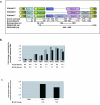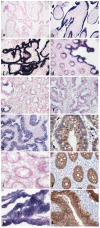Differential gene expression profile reveals deregulation of pregnancy specific beta1 glycoprotein 9 early during colorectal carcinogenesis
- PMID: 15982419
- PMCID: PMC1184062
- DOI: 10.1186/1471-2407-5-66
Differential gene expression profile reveals deregulation of pregnancy specific beta1 glycoprotein 9 early during colorectal carcinogenesis
Abstract
Background: APC (Adenomatous polyposis coli) plays an important role in the pathogenesis of both familial and sporadic colorectal cancer. Patients carrying germline APC mutations develop multiple colonic adenomas at younger age and higher frequency than non-carrier cases which indicates that silencing of one APC allele may be sufficient to initiate the transformation process.
Methods: To elucidate the biological dysregulation underlying adenoma formation we examined global gene expression profiles of adenomas and corresponding normal mucosa from an FAP patient. Differential expression of the most significant gene identified in this study was further validated by mRNA in situ hybridization, reverse transcriptase PCR and Northern blotting in different sets of adenomas, tumours and cancer cell lines.
Results: Eighty four genes were differentially expressed between all adenomas and corresponding normal mucosa, while only seven genes showed differential expression within the adenomas. The first group included pregnancy specific beta-1 glycoprotein 9 (PSG9) (p < 0.006). PSG9 is a member of the carcinoembryonic antigen (CEA)/PSG family and is produced at high levels during pregnancy, mainly by syncytiotrophoblasts. Further analysis of sporadic and familial colorectal cancer confirmed that PSG9 is ectopically upregulated in vivo by cancer cells. In total, deregulation of PSG9 mRNA was detected in 78% (14/18) of FAP adenomas and 75% (45/60) of sporadic colorectal cancer cases tested.
Conclusion: Detection of PSG9 expression in adenomas, and at higher levels in FAP cases, indicates that germline APC mutations and defects in Wnt signalling modulate PSG9 expression. Since PSG9 is not found in the non-pregnant adult except in association with cancer, and it appears to be an early molecular event associated with colorectal cancer monitoring of its expression may be useful as a biomarker for the early detection of this disease.
Figures





References
-
- Nishisho I, Nakamura Y, Miyoshi Y, Miki Y, Ando H, Horii A, Koyama K, Utsunomiya J, Baba S, Hedge P. Mutations of chromosome 5q21 genes in FAP and colorectal cancer patients. Science. 1991;253:665–669. - PubMed
-
- Kinzler KW, Nilbert MC, Vogelstein B, Bryan TM, Levy DB, Smith KJ, Preisinger AC, Hamilton SR, Hedge P, Markham A, et al. Identification of a gene located at chromosome 5q21 that is mutated in colorectal cancers. Science. 1991;251:1366–1370. - PubMed
Publication types
MeSH terms
Substances
LinkOut - more resources
Full Text Sources
Other Literature Sources
Medical
Molecular Biology Databases
Miscellaneous

